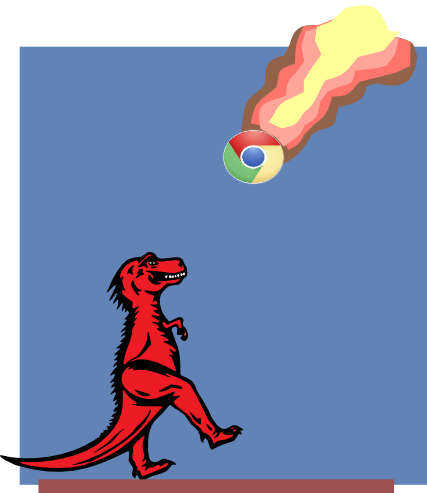| The Perils Of Mozilla |
| Written by Mike James | |||
| Thursday, 20 February 2014 | |||
|
Yes, it's a monster movie plot but you need to make sure that your sympathies are with the monster. Mozilla is riding high and creating lots of nice open source software, but its position is far from secure. It hangs by a thread and we should be worried.
Recently the computer press has been full of the rumor that Mozilla might sell advertising on the Firefox new tabs page which is shown to new users. The shock horror that greeted the news was as if a great betrayal was about to happen. Admittedly there is an irony as previously Mozilla made itself very unpopular with the advertising community by making "do not track" the default setting. In fact elements within Mozilla have been very vigorous in attacking the ad industry's use of the Internet. Yet the real irony is that most of Mozilla's money is ultimately derived from advertising anyway. Yes. that's right. Mozilla and Firefox have been serving you more ads than you could possibly imagine for the last few years. When we complain about Mozilla's mild attempt at getting some serious independent income, who do we expect to pay for this huge and growing enterprise? You need to think of Mozilla a a $300 million a year corporation to understand even a fraction of what it is about. Mozilla may be best known for Firefox, but if you survey all of the things it has an interest in then you begin to see how important it is within the whole software ecostructure. It is a huge powerhouse of products, services, technologies and standards. It may not always do things right, but without it far less would get done. The Mozilla community starts lots of projects many simply fizzle out, or are replaced by another more vigorous project. In fact Mozillians are so active that many an outsider must wish that they would slow down and concentrate on fewer higher quality projects. However, diversity and the right to diversify is what characterises open source - but this is to get side tracked. In the main, the huge cloud of small projects and initiatives tends to hide the bigger Mozilla picture and its single trend. . If you narrow your view to just the "big" projects, the ones that have the full backing of the Mozilla management, then instead of random creativity what you start to see is a pattern. Mozilla repeatedly attempts to protect itself from its biggest contributor - Google. Put simply, Google funds Mozilla and all its work and at the same time Google is slowly but surely cutting the ground from under Mozilla - and Mozilla fights back. Google has paid Mozilla large sums of money to ensure that it includes Google as the default search engine in Firefox. Since around 2006 more than 80% of Mozilla's revenue has come from Google. In 2006 Google paid $70 million for the search box. In 2009 Google launched Chrome, a direct competitor to Firefox. With Google having its own browser what need did it have of Firefox, and Mozilla in general? To a great extend Google's support of Mozilla hasn't been turned off because initially it needed the advertising space that the Firefox search box represented to grow its user base while Chrome started to gain users. A more important reason for Google needing to pay for the Firefox search box was to keep it away from others. There was a period when Microsoft would have liked Bing to be featured as Firefox's choice. This need to own the territory just to stop others owning it was responsible for the amount Google paid going up to $300 million per year. So Google is Mozilla's paymaster. Does this mean that Mozilla has been sucking up to Google and doing its bidding? Not a bit of it. Mozilla provides an open source competitor to Google, Microsoft and others - but mostly to Google, and this is an important observation as we shall see. When Google introduced Chrome it became a competitor to Mozilla's Firefox and Mozilla has had to add features to keep up. As well as keeping Firefox and its components, such as the SpiderMonkey JavaScript engine up to scratch, it has had to diversify into services and even operating systems. The point is that Chrome isn't just a browser, it is a gateway to Google's other services.
Mozilla has had to invent an authentication mechanism - Persona - and a way to allow users to log into Firefox in the same way that users log in to Chrome for synchronization purposes. In place of NaCl native apps it created asm.js to make JavaScript as fast as native. It has had to create web apps in response to Chrome apps. It has had to invent Firefox OS to make sure it has a platform for Firefox to rival Android and Chrome OS for Chrome. Recently it has started attempts to build an alternative to Google Maps and location services and even to Google Translate. These last two are tall orders even for a company being gifted $300 million per year - by it biggest rival. It is true that Mozilla's project portfolio could be seen as a sensible set of things to do in an ever-changing world. Of course every browser should spawn an operating system - it's only logical. (Unless it isn't as in the case of Microsoft's IE with an existing OS to protect. Yes, of course it is logical that Mozilla should do all of the things it does - but even if you don't accept that they are reactions to what Google does, you have to admit that they are competitors to what Google does. Now we come to the point. Don't get annoyed that Mozilla was thinking of taking some upfront advertising. It already accepts $300 million per year in advertising revenue - from Google, of course. The real problem is that this source of revenue is far from secure and this is why Mozilla needs to look for alternative sources of income. Would you hand over $300 million to a company that is increasing becoming a thorn in your side? No, of course you wouldn't and even if Google "does no harm" you can't really blame it were it to the plug. Unthinkable you say? Yes, I'd agree a quick switch off would produce an outcry and probably a protest. But there are more acceptable and subtle ways of dealing with the problem. A formula such as $200 million this year, $100 million the year after and so on would make it clear that Mozilla has to stand on its own feet, and who could complain? A formula such as matching Mozilla's "other" income would also seem reasonable, but choke the monster to death just as effectively given that Mozilla raised a paltry $900,000 in donations last year. Surely Microsoft would rush in and fund Mozilla in return for Bing being the default search engine? This is now very questionable. Microsoft makes huge losses on Bing and the rumors are that it is more likely to shut it down than pour millions more after it. So, while it is not impossible that Microsoft, or another company, would act as Mozilla's savior, it looks less likely and how we would all howl if the deal involved even more upfront advertising. Perhaps it's OK for Mozilla to accept advertising money as long was we don't have to see the ads explicitly as part of the Firefox experience. Someone, or something, has to fund Mozilla if it is to escape the peril it is currently in.
More InformationRelated ArticlesFirefox Launcher For Android - Why? Mozilla's End of Year Fundraising
To be informed about new articles on I Programmer, install the I Programmer Toolbar, subscribe to the RSS feed, follow us on, Twitter, Facebook, Google+ or Linkedin, or sign up for our weekly newsletter.
Comments
or email your comment to: comments@i-programmer.info
|
|||
| Last Updated ( Thursday, 20 February 2014 ) |





